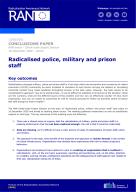Details
- Publication date
- 26 February 2021
- Author
- Directorate-General for Migration and Home Affairs
- RAN Publications Topic
- Prison and probation
Description
Radicalisation amongst military, police and prison staff is a hot topic within the prevention and countering of violent extremism (P/CVE) community as some incidents of members of such forces carrying out attacks or circulating extremist content have made headlines throughout Europe in the past years. However, the topic seems to be complicated to approach: due to its sensitiveness , it can be difficult to establish a full picture of the situation. What are the numbers, what are the different layers of the problem and how can we effectively counter it? And, more importantly, how can we create an awareness as well as neutral grounds for follow-up activities where all actors feel safe enough to share insights?
The RAN Small-scale Expert Session on the topic of “Radicalised police, military and prison staff” took place on 16 December 2020 and aimed at tackling these issues. The meeting gathered researchers as well as practitioner experts on this topic. The key outcomes of this meeting were the following:
- There was a shared sense of urgency that the radicalisation of military, police and prison staff is a pressing phenomenon that has not been explored enough: the risk is that it could be underrated.
- Data are missing, so it’s difficult to have a clear picture of cases of radicalisation of prison staff, police and military.
- The approach to the topic could benefit of the expertise and approach on insider threats in the context of critical infrastructure. Organisations may already have experiences with how to detect suspicious behaviour.
- Organisations and employers have options to work on creating an organisation that is resilient to radicalisation, with, on the one hand, awareness, reporting and sanctioning, and, on the other, attention to a healthy working climate, professional standards and the safeguarding of staff against risks related to their job, radicalisation being one of these.
This paper will reflect the outcomes of the discussion and, firstly, focus on the highlights of the discussion, such as a first reflection on the reasons why individuals radicalise within the police, military and prison, and then summarise the recommendations that were formulated by the experts, such as for institutions to allow researchers access to data.

